Business bulletin: 26 November 2020
New COVID-safe check-in system
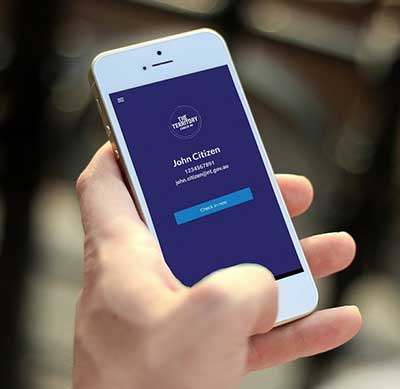
The Northern Territory (NT) Government will release a new app to help local businesses and organisations prepare for the introduction of the COVID-Safe Check-In systems on 30 November 2020.
Territory businesses and organisations that are required to collect visitor information can use the Territory Check In app, you do not need to set up your own system. The app is a contactless, secure and simple way for customers and visitors to sign into an establishment, using a QR code.
All venues that have a registered COVID safety plan will be automatically registered for The Territory Check In app and will be sent their own QR code to be displayed from 30 November.
When individuals arrive at a premises and scan the QR code, their details will be securely stored by NT Health for 28 days, to ensure contact tracing can occur quickly and effectively if it is required. Customer information will only be accessed if required for contact tracing.
Upon registration of the app, Territorians and visitors only need to supply their personal details once. You can also check in friends and family who might not have their own device. Every participating venue will have a unique QR code and scanning the code will automatically register the date and time of the visit.
From 30 November a new chief health officer direction will require establishments with a COVID safety plan to review their plans every six months and appoint a COVID safety supervisor from their team.
Specific businesses and organisations will be required to use a COVID-safe check-in system - such as the The Territory Check In app - to record contact details of visitors to their venue, if they intend to stay for longer than 15 minutes.
Venues that already record the required visitor information do not need to implement a new system or change their current system.
For those that do need to implement a new system, The Territory Check In app is not the compulsory platform. NT Health and the Territory’s small business champions will continue to work with local venues to make sure they have a system in place that works best for them.
As Territorians start to travel more over the Christmas period and visit family and friends, it is important that we take these extra steps to protect the health of our community.
The Territory Check In app is free to use, and will be available via the Apple App Store or Google Play to download and register from 30 November.
Stay up to date, go to the Coronavirus website.
Support available to adapt business
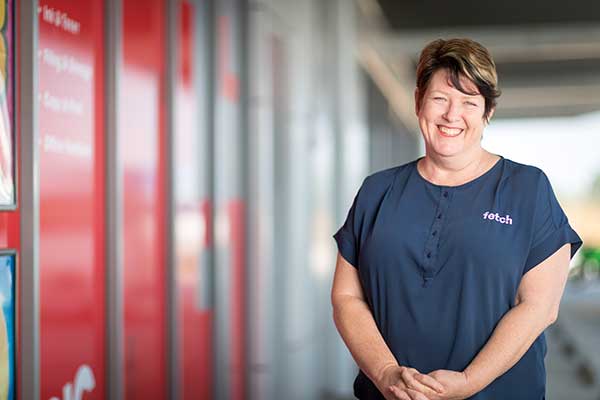
Territory small businesses that have been affected by COVID-19 will be able to access the Small Business Pivot Grant to help adapt to the new economic environment and reach new markets.
The new initiative is part of the Northern Territory Government’s Jobs First Plan, to protect existing jobs, create new jobs and prepare Territorians for jobs of the future.
The Small Business Pivot Grant is focused on helping Territory businesses improve their digital capabilities including e-commerce solutions and the use of technology to improve visibility and profitability and reach new markets.
Applicants can use the grant funding to obtain new technology and digital equipment, undertake future skilling, make physical improvements to their business premises and purchase equipment and infrastructure that may assist the business access new markets.
Grants of up to $10,000 will be available for eligible businesses, with a matched 50:50 co-contribution requirement.
Applications open on 1 December 2020 and close 2 February 2021.
For more information and the terms and conditions, go to the Business Recovery website.
Enhancing the Territory’s workforce

The Northern Territory (NT) Government will help Territory small businesses by filling the gap in the Australian JobMaker Program and address hiring needs for new workers with two new schemes.
The schemes are part of the NT Governments Jobs First plan to create new jobs, develop new industries and make the Territory the easiest place in Australia to do business.
Under the first scheme, the NT Government will provide funding to boost the Australian Governments JobMaker Hiring Credit Scheme.
This funding will be used to provide eligible Territory small businesses with $100 per week for eligible employees between 30 and 35 years of age and $200 a week for employees over 35 years of age.
Employers can register for the scheme from 1 December 2020 and provide their payroll and FTE as a baseline.
Claims can be made from February 2021 on a quarterly basis, noting payroll evidence may be requested at the time.
The payment is in addition to all existing programs and aims to get unemployed Territorians into work.
The second scheme includes the NT Government co-contributing matched funding to any peak industry body to support their interstate marketing campaigns that target workers to come to the Territory to fill needed jobs or skills listed under the NT Skills and Occupation Priority List.
To be eligible you must be a recognised peak body in the NT and the campaign must target workers outside of the Territory.
Applications for both schemes open on 15 December.
For more information, go to the Business Recovery website.
Territory trainers recognised at national awards
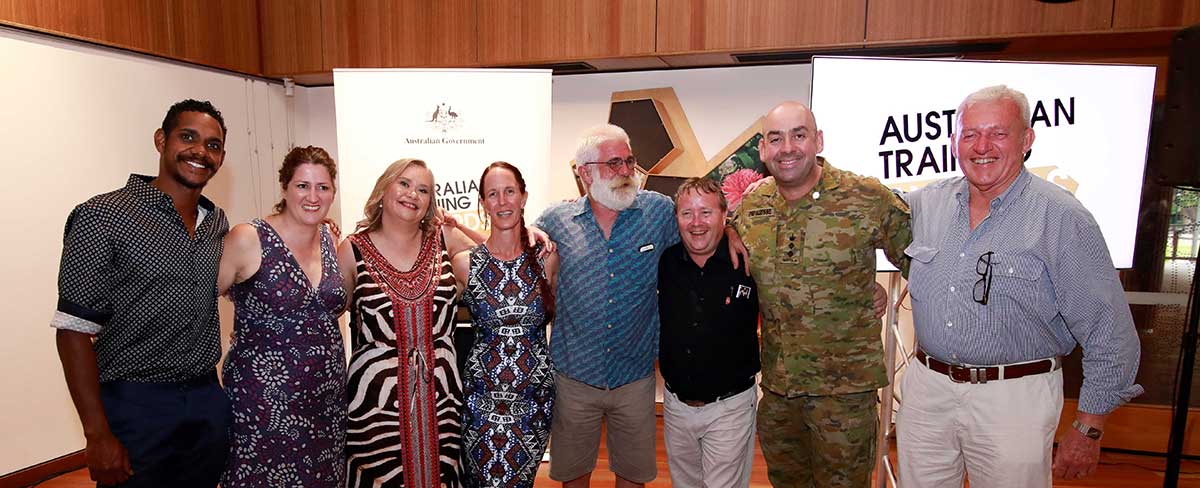
Caption: (L-R) Dale Dhamarrandji, Aboriginal and Torres Strait Islander Student of the Year, Rachael Leigh Taylor, Excellence in Language, Literacy and Numeracy Practice Award and Batchelor Institute of Indigenous Tertiary Education and the Australian Defence Force.
An imaginative collaboration between the Batchelor Institute of Indigenous Tertiary Education and the Australian Defence Force has been recognised at the 2020 Australian Training Awards.
The two organisations were named the Australian Industry Collaboration Award winner in 2020.
For almost 50 years, the Batchelor Institute of Indigenous Tertiary Education has advocated for the rights of Aboriginal and Torres Straight Islanders to access quality education and training services.
The Australian Defence Force have a similar commitment to increase Aboriginal Australian representation on the Army, Navy and Airforce.
The two organisations have collaborated to make a career as a soldier more attractive to Aboriginal Australians and developed a new program as part of the Regional Education and Development Course.
Over a 13 week period, students are immersed in a shared culture of learning, while developing foundation skills and absorbing the beliefs, attitudes and practices in the Army. Students are monitored daily by staff from the institute and the Army with their performance, progress and wellbeing assessed fortnightly.
Teacher, Rachael Leigh Taylor was named winner of the Excellence in Language, Literacy and Numeracy Practice Award.
Rachel started her career as an international English as a second language teacher delivering and developing foundation skill programs to support migrant workers, refugees and workers in an international workplace context.
She now works in a high school context to engage young people in adult education through vocational education and training programs with targeted skill support.
And Dale Dhamarrandji was named runner up for the Aboriginal and Torres Strait Islander Student of the Year Award.
Dale who studied at Charles Darwin University completed a Certificate III in Mobile Plant Technology. He is also the first Yolngu apprentice who has completed a heavy diesel apprenticeship at Rio Tinto’s Gove operations.
To view the full list of winners, go the Australian Training Awards website.
Training on the job
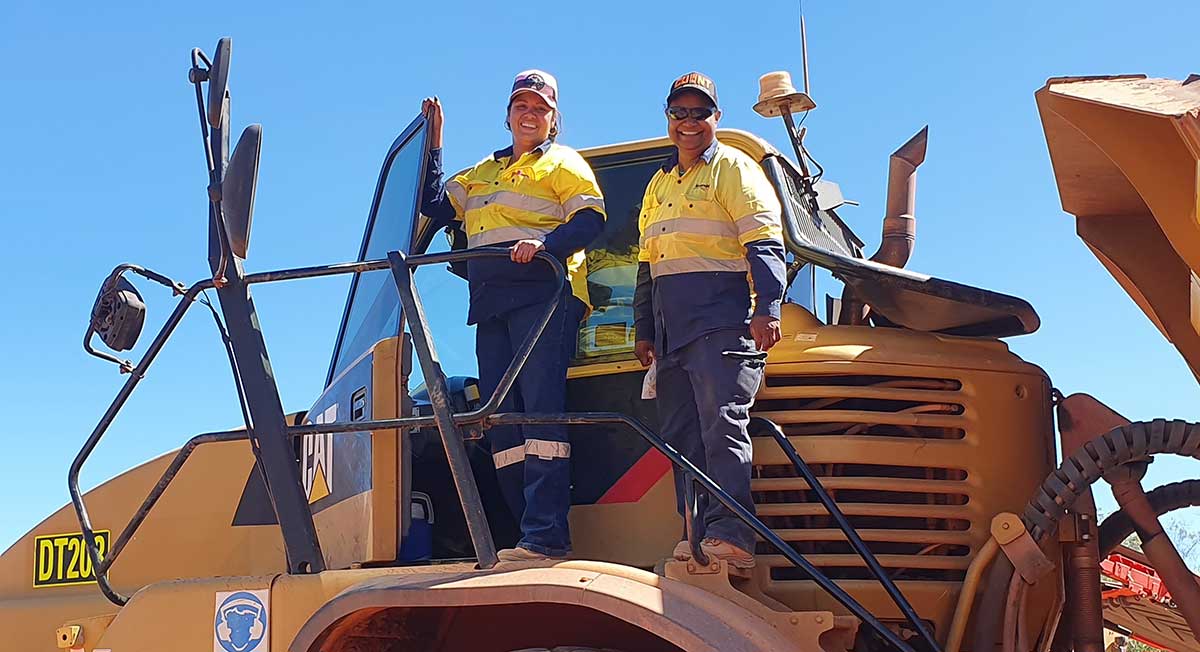
Caption: Sanella Ford Hopkins (left) and Audrey Hammer at Keep River.
An Aboriginal workforce in training were among the builders of major roadworks at the Keep River Plains.
Darwin-based labour hire and recruitment company IE Project, which was contracted to provide Aboriginal employment services, received a Territory Government workforce grant of nearly $87,000 to upskill the Aboriginal workforce.
The workers started at various skill levels - some were working in civil construction for the first time, others needed upskilling to work machinery, such as excavators, dozers and loaders, and some needed their high-quality skills accredited for the future.
Twenty-four people gained qualifications and accreditation while working on the 12-month Keep River Road construction project near Timber Creek, which was delivered by the Department of Infrastructure, Planning and Logistics (DIPL).
Carey Training delivered Certificate IV in Civil Supervision and Batchelor Institute of Indigenous Tertiary Education delivered Certificates II and III in Civil Construction, as well as 75 machinery tickets.
The Department of Industry, Trade and Tourism manages the Territory Workforce Program, which provided the grant to DIPL, that helps organisations develop industry-driven initiatives to maximise job opportunities and build a skilled workforce.
IE Project director Wendy Moulds said some of the Aboriginal Territorians worked on the project from start to finish.
“The whole program was fabulous,” she said. “It was very well received by the workforce with highly experienced people mentoring and training within the IE crew.
“There was a fantastic willingness to work on a large-scale project such as this with the capacity to deliver training and gain great exposure and experience.”
Ms Moulds said head contractor Exact Contracting was ‘very supportive’ of upskilling the crew.
Global audience embrace Aboriginal art
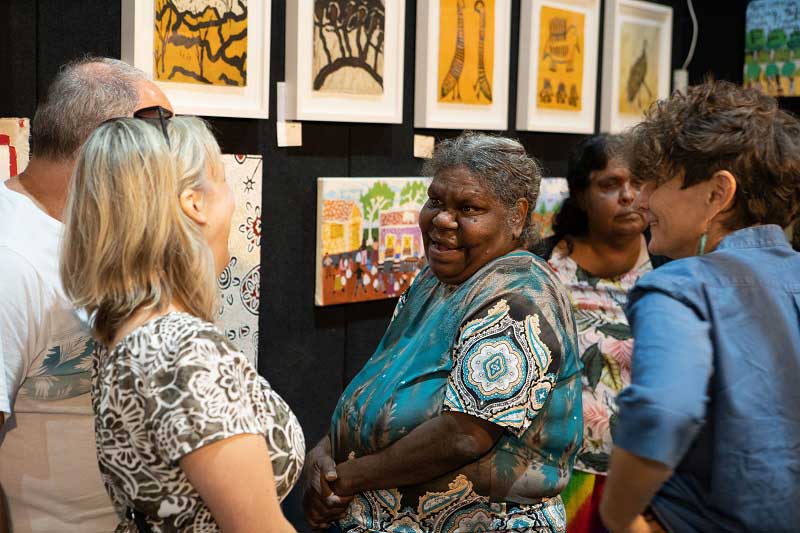
Caption: Tangentyere artists at the Darwin Aboriginal Art Fair, which was an online sale this year. Photo: Dylan Buckee.
Darwin Aboriginal Art Fair (DAAF) has reached out to the world during COVID-19.
Most sales were domestic in the past.
But COVID-19 forced organisers to look at marketing afresh - and they developed an innovative way to attract new international customers.
The smart thinking earned DAAF the Department of Industry Tourism and Trade Resilient Territory Business of the Year at the Chief Minister’s Export and Industry Awards.
International art houses often send buyers to the fair in Darwin to acquire works for their galleries.
But the 14th annual fair had to pivot as an online-only event this year because of the coronavirus.
The fair was reworked in less than three months by the small, hard-working DAAF team.
The strategy worked - the fair was profiled in 85 international news outlets and overseas sales tripled, making DAAF an established Territory exporter.
The online platform attracted 44,784 unique visitors from across Australia and overseas.
It is estimated that the fair gained exposure to 110 million people worldwide.
The event supported 1,335 artists from 69 art centres.
DAAF Director Claire Summers hopes the success of the virtual fair will help fuel the re-emerging interest in Aboriginal art.
The not-for-profit organisation, which has a reputation for innovation, diversity and cultural integrity, has Aboriginal art centre members throughout Australia, but half the membership is from the Territory.
It does not charge commission.
Congratulations to all 46 finalists for the 2020 Chief Minister’s Export and Industry Awards, in particular winners of the following department sponsored awards:
- Darwin Aboriginal Art Fair - Resilient Territory Business of the Year
- Alana Kaye College - StudyNT International Education and Training Award
- Captovate - Industry Innovation Award
- Airnorth - Resource Supply and Service Award
- Manfred Mletsin - StudyNT International Student Award.
Give feedback about this page.
Share this page:
URL copied!